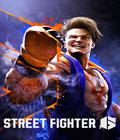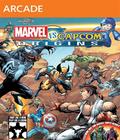Not long ago, Jojo's Bizarre Adventure HD Ver. was released. It didn't exactly set the West on fire, partly due to the niche status of the property here, and partly due to the no-frills, bare-bones porting job it received. Fortunately, Capcom treated my two favorite fighting games of all time — Marvel Super Heroes and the original Marvel vs. Capcom — with a little bit more respect, no doubt thanks to a little move that has made most of Marvel's characters big business. This duo of games is the cornerstone of Capcom's high-flying, super-jumping, air-comboing, beam-laden Vs. series. They're also a fair sight more balanced than the latest entry in the series, but we won't dwell on that too much today.
What matters is how well these two games hold up in 2012, and how well done the ports are. As a longtime fan of both titles, I can say that this iteration, as with just about all of Capcom's fighters, leaves the games fully intact in terms of playability. All moves and motions work just fine, though for best results, you may want to use a specialty fighting pad or stick since the Xbox 360 controller can be finicky using either analog control or the d-pad. Far more so than current entries, perfect control is a must because these are slower, more methodical games hailing from older hardware. However, that does not reduce their depth or viability one bit.
Marvel Super Heroes (MSH) arrived in arcades in 1995, as a refinement/sequel to X-Men: Children of the Atom, the game that birthed the Vs. series. Quite a few Marvel characters make their fighting game debut here, from longtime favorites such as Captain America, the Hulk and Spider-Man to obscurities like Blackheart and Shuma-Gorath. Aerial mobility and combo creation were core mechanics, but the huge thing that sets apart this game from all others in the series is the use of Infinity Gems, brought in from the comics saga this game chronicles.
Unlike more recent "equalization" systems (such as X-Factor in Marvel Vs. Capcom 3 or the gems in Street Fighter X Tekken), the Infinity Gems were actually well implemented, made to be used during strategic times to slightly turn the tide of a match, but not dominate it. They can be used to ensure victory or help a player out of a bad match-up, and each character gets a super-special use out of each one based on his or her story line. For example, Magneto can use the Space Gem to form a temporary magnetic shield rendering him invincible. Iron Man can use the Soul Gem to heal his heart and thus his life bar. Hulk can use the Time Gem to make his strongest punches combo off of each other. It sounds insane, but it absolutely works, arguably making the game fairer than if they had never been included.
Character also extends to offensive and defensive attributes in MSH, allowing players to learn the ins and outs of their chosen fighter and adapt them to matches. Wolverine only takes half damage but is frail. Hulk and Juggernaut are heavy hitters. Shuma-Gorath can steal health with his throwing moves. Characters are more than just a set of hitboxes that do similar damage and are only set apart in how well they can control space. In this way, Marvel Super Heroes actually holds up as more of a technical fighter than nearly all of its brethren, despite its age and smaller cast. For Origins, Capcom has added a few neat extras, like the ability to play as sub-boss Doctor Doom, final boss Thanks and Anita from Darkstalkers, which were only available as secret extras in Japanese versions of the game. All of these totally break the balance, but they're still fun.
Marvel Vs. Capcom (MvC), released three games later in 1998, kicks the series up a few notches, bringing in more heroes and villains to join Marvel's side while pitting them against warriors from all across Capcom's storied history. If you ever wanted future-ninja Strider Hiryu to face off against War Machine, this was your game — before the turn of the millennium, anyway. New techniques introduced by this time included the ability to choose from a huge group of assist characters and to bring both characters on-screen at once, simultaneously controllable and with infinite Super Meter for a short time. Again, it was kind of crazy but provided years of fun despite some mild balance issues. With that said, MvC still holds up as a simpler, less confusing game than what we would see from future installments. No real extras were provided like in MSH, but the game was so chock full of secret characters, assists and techniques that it didn't really matter. This was one of the fighting games of the '90s, and it's absolutely worth a spin.
As far as universal frills go, there are multiple ways to view the games, from widescreen to an over-the-shoulder perspective. Multiple filters are also included to make the low-resolution visuals look tolerable on current televisions — scanline emulation always has been and always will be a godsend. Training modes are available for both games, including switches that allow for situational Infinity Gem (MSH) or assist usage (MvC). There's also a multi-tiered achievement system that links to the in-game vault where you can view concept art and the like. Finally, online play is included for the first time in the West for both of these games. Said online has GGPO support built in — pretty much the best netcode in the business for older games like this — along with the eight-player lobby and spectator mode that's gone into Capcom's more recent releases. While the game doesn't go the whole hog and give us full dipswitch control like the Street Fighter III: Third Strike port, what's here is pretty satisfying and rounds out the package.
Marvel vs. Capcom Origins is a near-royal treatment given to a duo of games that have stood the test of time. These should have come far earlier than they did (namely, before the current-generation releases of Marvel vs. Capcom 2 and 3, and arguably even Tatsunoko vs. Capcom), but hopefully this collection will give two great games a new lease on life. If you think the current Marvel fighting games have a little too much going on to track of, then I would absolutely recommend going back a couple of decades. There's still a ton of fun to be had there.
Score: 8.0/10
More articles about Marvel vs. Capcom Origins











 Marvel vs. Capcom Origins is a compilation of two of the most popular arcade games of the '90s; Marvel Super Heroes and Marvel vs. Capcom: Clash of Super Heroes.
Marvel vs. Capcom Origins is a compilation of two of the most popular arcade games of the '90s; Marvel Super Heroes and Marvel vs. Capcom: Clash of Super Heroes.




















